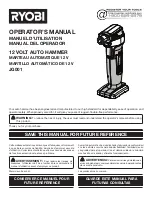
3
MOTO-A2
17449
0.2 HP
60 Hz
Rotary-tool
0.05", 0.09" y 0.12"
1.2 A
10 000 RPM - 36 000 RPM
Code
Description
Power
Voltage
Frequency
Current
Speed
Collets
30 minutes work per 15 minutes idle. Maximum 3 hours per day.
Duty cycle
Conductors
Class II
Insulating
Power Cord Grips used in this product: Type “Y”.
Tool Build Quality: Double insulation
Thermal insulation on motor winding: Class E
127 V
Technical Data
18 AWG x 2C with insulating temperature of 167 °F
ENGLISH
WARNING
WARNING
Avoid the risk of electric shock or severe injury. When the power cable gets damaged
it should only be replaced by the manufacturer or at a Authorized Service Center.
The build quality of the electric insulation is altered if spills or liquid gets into the tool while in use.
Do not expose to rain, liquids and/or dampness.
Before gaining access to the terminals all power sources should be disconnected.
IP20
IP Grade
from 0 A and up to 10 A
from 10 A and up to 13 A
from 13 A and up to 15 A
from 15 A and up to 20 A
18 AWG(*)
16 AWG
14 AWG
8 AWG
16 AWG
14 AWG
12 AWG
6 AWG
3 (one grounded)
Ampere
Capacity
Number of
Conductors
Extension gauge
* It is safe to use only if the extensions have a built-in artifact for over current protection.
AWG = American Wire Gauge. Reference: NMX-J-195-ANCE-2006
When operating power tools outdoors, use a grounded
extension cable labeled “For Outdoors Use”. These extensions are especially designed
for operating outdoors and reduce the risk of electric shock.
WARNING
from 5.9’ to 49.2’ | higher than 49.2’
Power Requirements
Tools with double insulation and reinforced insulation are
equipped with a polarized plug (one prong is wider than the other). This plug will
only fit in the right way into a polarized outlet. If the plug cannot be introduced into
the outlet, reverse the plug. If it still doesn’t fit, call a qualified electrician to install
for you a polarized outlet. Do not alter the plug in any way. Both insulation types
eliminate the need of both a grounded third power cord with three prongs or a
grounded power connection.
When using an extension cable, verify the gauge is enough for
the power that your product needs. A lower gauge cable will cause voltage drop in the line, resulting in power loss and
overheating. The following table shows the right size to use depending on cable’s length and the ampere capability shown in
the tool’s nameplate. When in doubt use the next higher gauge.
WARNING
WARNING










































